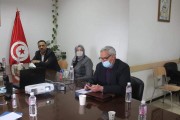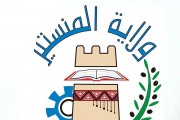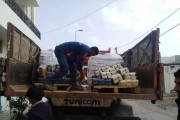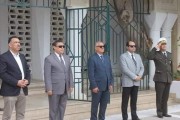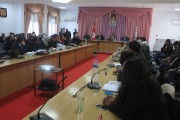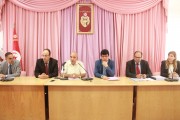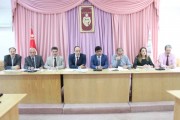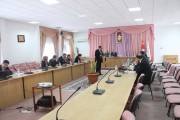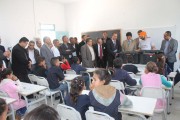Presentation of the Family Social Empowerment Program in the State of Monastir As part of the presentation of the National Social Empowerment Program for Families and presentation of the different axes of this program and its objectives and of the social group targeted in this program,
an inaugural day for this program was organized today, Wednesday, December 29, 2021 at the seat of the State, under the tutelage of Mr. Affairs of the State of Monastir, in the presence of Mr. Bashir Attia, the State Clerk, and Ms. Monia Al-Daghmoury, with his wife, the regional delegate for women, family, children, the elderly, accredited gentlemen, mayors and representatives of departments and interests regional. The Prime Minister underlined the importance of this important national program, which goes back to the origin and the basis of the information, the accompaniment and the support to the family and the Tunisian family, which is the first link and core of society, since socialization and the construction of a balanced and cohesive society on sound foundations proceed from a cohesive, balanced and economically and socially stable family. The First Commissioner authorized the formation of the regional committee or the animation committee to monitor the implementation of this national program, inviting the representatives of all regional and local administrations to get involved in this program and to work for its success. by presenting the necessary data, proposals and solutions that would contribute to improving the economic and social situation of families, underlining in the same context the need to involve national organizations and representatives of the components of civil society in the state of Monastir to benefit from his experience and his field experiences and his knowledge of the reality of certain families who meet the conditions to benefit from this national social empowerment program. Monia Al-Daghmouri, with her wife, the regional delegate for women, family, children and the elderly, presented the characteristics of the national program for social empowerment of families in the state of Monastir, which is part of the program of the Ministry of Women, Family and the Elderly on the social empowerment of families, which aims to advance families and protect them from the risks they face, as well as to accompany and support them to enable them to to progress socially and economically. She added that the regional delegate for women, families and the elderly in Monastir had signed an agreement with the “Land for integration and integral development” study office during the last month of October, in order to implement the family social empowerment program in the state of Monastir, which will include approximately 6,500 families in the region and will run over a period of 24 months, starting from the date of signing of the 'OK. 4 Axes of the National Economic Empowerment of Families Program Ms. Iqbal Al-Hayzam, Head of the Department of Women and Family Affairs at the Regional Delegate for Women, Family, Childhood and Elderly Affairs presented four axes for the Social Empowerment Program for Families in Monastir, in particular the first axis, which is the rehabilitation of married life, which is based on Developing mentalities and rehabilitation of married life, preventing negative behavior and consolidating the principle of gender equality for the benefit of those who are about to get married for the benefit of 500 young men and women in the different delegations of the wilaya of Monastir. The second axis is the development of methods of dialogue within the family, based on the further consolidation of parental education and the dissemination of the culture of dialogue and the development of awareness of civilized behavior of a healthy education. for the benefit of 2000 families in the region. The third axis of this program is based on the prevention of family members against risky behavior and protection against extremist ideology, suicide, drug addiction, irregular migration, organized crime and violence. This axis should include 3,000 families in the various State delegations. from Monastir. The head of the Department of Women and Family Affairs added that the fourth axis of this national program will include at least 1,000 families, and is represented in psychological and health support, legal guidance, social information and family mediation. for families suffering from maladaptation. Sociology of the Tunisian family: the state of Monastir as a model In turn, Dr and expert Belaid Awlad Abdallah, head of the work of the study office "Land for integration and global development", presented an intervention on the initial report of this study under the title "The sociology of the Tunisian family: Monastir as a model", stressing that the study Elle was launched according to a scientific approach and based on the diagnosis of the reality of the Tunisian family and the family in the state of Monastir as a model based on the analysis of the family structure and its social education and challenges that the Tunisian family generally experiences in the face of the difficult economic and social situation, the deterioration of the health situation, the precariousness of work, the spread of poverty and divorce, disintegration, which contributes to delinquency and to reflection on migration irregular (harga) or extremism sometimes. The doctor and expert, representative of the Bureau of Studies, added that the program for the social empowerment of Tunisian families helps to increase and strengthen the spiritual, political, social and economic capacities of individuals and societies through monitoring, 'guidance, information and support available to individuals and families to materialize the options and procedures available to them. This would improve the economic and social situation of individuals and families in general. The expert, Belaid Awlad Abdullah, stressed that the study will be based on the organization of courses, meetings, workshops, various activities, and awareness-raising and awareness campaigns on the culture of economic empowerment. and social and its importance for the family in general, through work on prevention and protection of family members and their care, supporting them and then integrating them into economic and social life. The doctor and expert representative of the Office of Studies reinforced his intervention by presenting a set of examples, indicators and results of the preliminary diagnosis of the composition and type of families in the State of Monastir, i.e. more than 133 thousand families, including more than 16,000 families in need or with limited income, stressing that the state of Monastir An attractive area witnessing a high population density, which explains the great diversity in the composition of families between normal families , complex families and alternative families. They are effective in cases of violence within the family, especially those imposed on women and children. The representative of the Studies Office concluded his intervention by renewing the invitation to all stakeholders at regional and local levels and to representatives of the components of civil society to contribute to this study of the social empowerment program of families in the State. of Monastir, which will build on gender, especially rural women, children, youth and adolescents who are most vulnerable to threats and violence, stressing the need that the objectives of this study and the program national be one of the foundations of good socialization within Tunisian families in general, and families in Monastir as a model. {gallery} zd {/ gallery}






